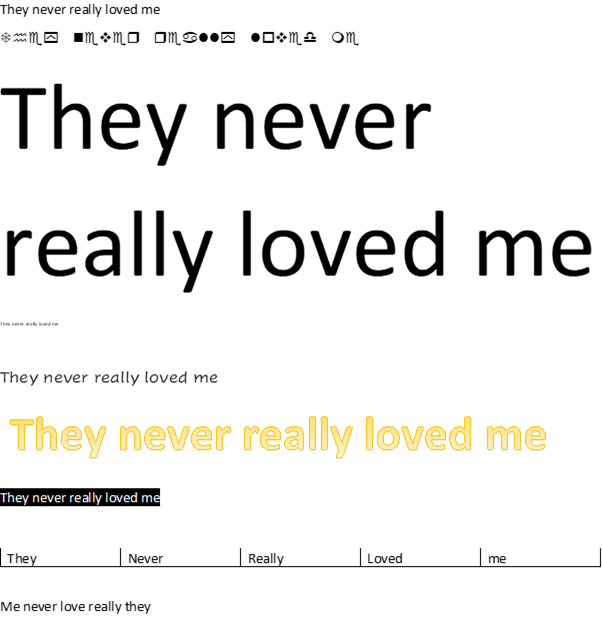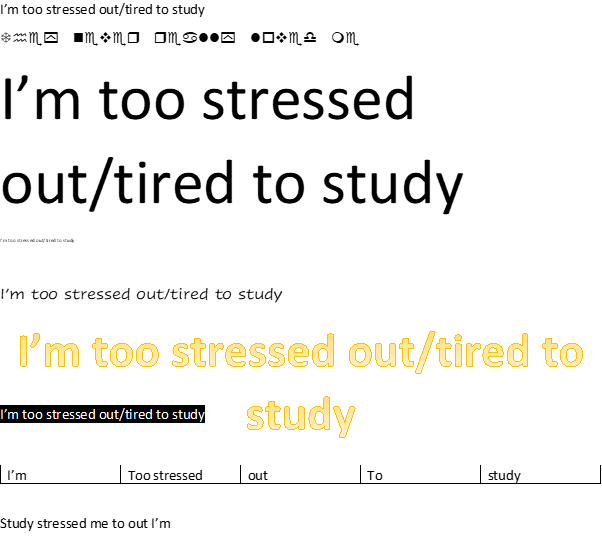
In the Studyology program I teach, I encourage students to develop a mindfulness ritual that is conducted at the point at which the person has scheduled to start their study or formed the intention to study.
This ritual is intended to disrupt automatic patterns of avoidance that can get established (i.e. procrastination).
The ritual isn’t super complex or long. It combines some kind of present moment exercise (e.g. mindful breathing), making room for whatever thoughts and feelings and sensations emerge (defusion and acceptance) and the explicit expression of a statement of valued intent (more on this later).
For the defusion exercise, I tend to teach some variation on the leaves on a stream idea. It is a visualisation where one imagines placing one’s thoughts, memories, images, on leaves floating gently by on a stream. Similar versions involve clouds in the sky, ads on a bus etc.
The idea is to observe that thoughts and beliefs come and go of their own accord and there isn’t necessarily a need to treat any one of them as more important than another. We can watch thoughts come and go, as though we were spectators at a passing parade.
Defusion exercises aren’t necessarily easy to do. Our mind tends to wander from the core visualisation. We tend to get wrapped up in certain thoughts (sticky thoughts) and ruminate on them. We get distracted by certain clusters of thoughts (stories) that we feel characterise who we are, our life, our circumstances. We ‘fuse’ with certain ways of thinking.
Therefore defusion exercises require practice, and often trying a few different ones to find ones that resonate better.
In the hypnosis program that I am currently doing I came across a defusion technique that I think might be a good one for students specifically, because it takes advantage of using a computer. And let’s face it, when it comes to studying at uni, a lot of time is spent in front of computers.
This defusion technique encourages you, during times of stress or distress, to type one’s thoughts and beliefs into a word processing program. You then take the thoughts and memories that are negatively emotionally laden and utilise various word processing techniques to change their shape and colour and design.
For example, I took the thought ‘they never really loved me’ and subject it to a few different formats – wingdings, word art, large and small, different fonts, even a table and reordered.
You are limited only by your imagination.

At first the process is a little disconcerting. If you’ve picked a thought/belief that is quite sticky and difficult seeing it so boldly in front of you can be unsettling.
But play with the words some more. Notice they are just words. Notice how easily you can manipulate and modify them. As you do so, ask yourself if you are more willing to have these words in your head and remind yourself that they are only words.
Having played with them for a while, you might decide to then delete them. I think of this as giving them permission to go. Yes, they might come back again, but the next time they do, you can play with them in the same way (or find some even more imaginative ways to play with them).
Finish with an intention
The thoughts/beliefs that are most sticky tend to be ones that relate to an area of our life which is important to us.
The thought included above, which speaks to the grief of rejection, hurts because of a desire we probably all have to be loved.
So should I be defusing all thoughts about being loved?
No. Defusion exercises are intended to weaken the impact of thoughts that derail us from our goals and values. If I fuse with the idea ‘they never really loved me’ then I’m likely to channel that energy into avoiding people, questioning my self-worth, regarding myself as someone worth rejecting. Those responses won’t bring forth the outcomes I want or value. They’ll most likely lead me to feel bad about myself, act poorly around others, and bring about more of the thing I fear (rejection).
So I like to finish a defusion exercise with a statement of what I’ll do to move towards my values, to take a better path than the one I’d take if I followed that thought/belief.
In this case it might be something along the lines of:
“I’ll spend time with those people who I know care about me” or “I’ll make a gift for a close friend”.
Notice that an intention is a desired action, not a challenge of the truth of the thought. An intention isn’t “well perhaps they did love me” or “it doesn’t matter if they loved you or not”. An intention is a statement of how I am going to live my life in a way that seeks to bring forth the goals and values I want.
Let’s go with a study example
Let’s leave aside the love-soaked example for a moment 😆
When we sit down to work/study or form the intention to work/study many different thoughts and beliefs can show up.
“I don’t want to do this”
“I’d rather be doing …………”
“I can’t do this, it’s too hard”
“I’m too stressed out/tired to study”
Those thoughts/beliefs are like the precursors to disengaging from our work (procrastinating). If we fuse with them, that is the most likely outcome.
So we might take those thoughts (let’s take the last one) and subject it to some word processing magic.

Feel free to go wild on the different ways that you play with the words.
You might finish this process with the statement (and enactment) of an intention.
“I’ll do 30 minutes of study then reassess”
“I’m going to study because getting this degree is an important step towards my bigger goals”
Notice that second one captures the goals/values that you are working towards.
Final words
Defusion techniques help us make room for our inner voice, but not follow it if what it is saying takes us away from our goals or values.
They are useful because our inner voice isn’t always leading us in the direction that is right for us.
The defusion technique described in this post is one that I think is well suited to the study setting, because it gets its value from being able to use the features found in a modern word processing program.
Try it out the next time you notice yourself delaying or avoiding study.
Remember, play with the thoughts/beliefs that are driving this avoidance and finish with a recommitment to your goals and values and choosing an action that moves you towards them, rather than towards the negative/unhelpful beliefs.
Defusion is just one of a number of psychological techniques we teach in the Be Well Plan. We are running the last Be Well Plan for 2021 in October. You can still sign up.

